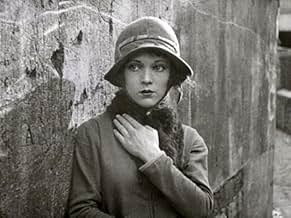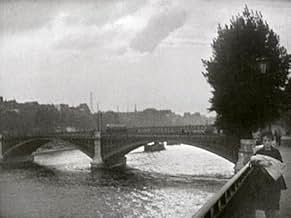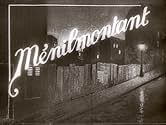Ménilmontant
- 1926
- 38m
IMDb RATING
7.8/10
2.9K
YOUR RATING
A couple is brutally murdered in the working-class district of Paris. Later on, the narrative follows the lives of their two daughters, both in love with a Parisian thug and leading them to ... Read allA couple is brutally murdered in the working-class district of Paris. Later on, the narrative follows the lives of their two daughters, both in love with a Parisian thug and leading them to separate ways.A couple is brutally murdered in the working-class district of Paris. Later on, the narrative follows the lives of their two daughters, both in love with a Parisian thug and leading them to separate ways.
- Director
- Writer
- All cast & crew
- Production, box office & more at IMDbPro
Featured reviews
This is one that no one can afford to miss in a lifetime of viewing, that is no one who's interested in the deepest workings of how things move. In my third viewing now, it may just be the pinnacle of the first 30 years. But before saying more, let's quickly clear the air from fixed perceptions so it can rise up in front of us vibrantly as what it is, all the more greater.
First to reclaim it from the museum of merely academic appreciation that covers, silents in particular, with the shroud of musky relic. Coming to us from so far back it may appear as the studied work of a venerable master - and yet it's the work of a 25 year old (filming started in '24) who shot it by himself with his girl around Paris, hand-held, and edited in camera.
The workings of fate or grande history that demand crowds and decor are pushed to the side, this is a youthful cinema ("indie" we would call it now) that beats with the heart of young people trying to fathom life in the complex city and I urge you see it as such. Kirsanov was an émigré new to Paris after all. Watch it as puzzling modern life that keeps you awake at nights, not as some scholar's symbolism.
Then to reclaim it from the clutches of "experimental" and "avant- garde", labels as though it were just about the tweaking of form, an exercise of trying to be ahead of time. There are many of those from the era, marvelous experiments in seeing, and Kirsanov was not just a wide-eyed country boy - he had articles published on "photogenie" before he made this and would know the radical tropes. But this enters beyond.
The best way I find myself able to describe it is this.
There's a story here that you can unfold in a way that it makes simple sense, melodrama about an orphaned girl lost in the big city. Melodrama since well before of course, offered us a certain facsimile of life where this clearly begat that, the disparity caused grief, the resolutions restored clarity. There's a heart breaking scene here on a bench worthy of Chaplin. She wanders with a baby cradled in her arms, trials and tribulations that innocence must go through.
Now this facsimile rippled and violently tossed about like curtains at an open window are shuffled by gusts of air, ellipsis, abstraction, rapid-fire montage, and all the other tools that Kirsanov would have known from being in Paris at the time of Epstein and others. So far so good. The film would have been great with just this mode, wholly visual, "experimental". The girl Nadia is lovely, the air dreamlike.
But there's something else he does, that is still in the process of being fathomed decades later by penetrative thinkers like Lynch. There are hidden machinations in the world of the film, illogical machinery at play, that turn at a level deeper than we can clearly fathom at any point. You should know here that Kirsanov had to cross a Europe collapsing by war and revolutions to reach Paris, he would have found out months after he left home that his father had been murdered on the street by communist thugs.
Suddenly there is the nagging sense of a presence that moves behind appearances, giving rise to mysteriously connected perturbations. A marvelous sequence shows one sister being seduced in a room (uncertain, but giving in), the other sister alone in their bed reading from a book as if daydreaming the whole dalliance.
And then the second sister knowingly letting herself be seduced, the first observing the scene from below as if she has splintered off into separate selves, one being seduced above, the other realizing in hallucinative daydream the mistake of giving herself to this boy.
This is marvelous. Impulses from an open window, and through the flimsy fabric of the curtains, the vague coming and going of people in a room, half-finished glimpses, but we begin to sense pattern here. Two girls, two murders, two seductions, but one calculated and wrong.
The most startling moment is the opening; a puzzling violence has stolen into this world, creating the story, rendered with haunting imagery of a struggle before a window. Now every account of the film I've read believes these are the parents of the girls and some madman, but this is not said anywhere. In the graveyard after, we see the father's grave with wreaths, a funeral that day, but none on the mother's, it looks abandoned. Maybe someone was caught where he shouldn't have been, calculated and wrong.
And this veiled and bubbling causality goes through everything to appear again in the finale; the first murder wasn't random, what says the second is? Maybe a holdup just so happened to visit him, maybe someone was paid off. The door is open, you go in where your body takes you.
Something to meditate upon
First to reclaim it from the museum of merely academic appreciation that covers, silents in particular, with the shroud of musky relic. Coming to us from so far back it may appear as the studied work of a venerable master - and yet it's the work of a 25 year old (filming started in '24) who shot it by himself with his girl around Paris, hand-held, and edited in camera.
The workings of fate or grande history that demand crowds and decor are pushed to the side, this is a youthful cinema ("indie" we would call it now) that beats with the heart of young people trying to fathom life in the complex city and I urge you see it as such. Kirsanov was an émigré new to Paris after all. Watch it as puzzling modern life that keeps you awake at nights, not as some scholar's symbolism.
Then to reclaim it from the clutches of "experimental" and "avant- garde", labels as though it were just about the tweaking of form, an exercise of trying to be ahead of time. There are many of those from the era, marvelous experiments in seeing, and Kirsanov was not just a wide-eyed country boy - he had articles published on "photogenie" before he made this and would know the radical tropes. But this enters beyond.
The best way I find myself able to describe it is this.
There's a story here that you can unfold in a way that it makes simple sense, melodrama about an orphaned girl lost in the big city. Melodrama since well before of course, offered us a certain facsimile of life where this clearly begat that, the disparity caused grief, the resolutions restored clarity. There's a heart breaking scene here on a bench worthy of Chaplin. She wanders with a baby cradled in her arms, trials and tribulations that innocence must go through.
Now this facsimile rippled and violently tossed about like curtains at an open window are shuffled by gusts of air, ellipsis, abstraction, rapid-fire montage, and all the other tools that Kirsanov would have known from being in Paris at the time of Epstein and others. So far so good. The film would have been great with just this mode, wholly visual, "experimental". The girl Nadia is lovely, the air dreamlike.
But there's something else he does, that is still in the process of being fathomed decades later by penetrative thinkers like Lynch. There are hidden machinations in the world of the film, illogical machinery at play, that turn at a level deeper than we can clearly fathom at any point. You should know here that Kirsanov had to cross a Europe collapsing by war and revolutions to reach Paris, he would have found out months after he left home that his father had been murdered on the street by communist thugs.
Suddenly there is the nagging sense of a presence that moves behind appearances, giving rise to mysteriously connected perturbations. A marvelous sequence shows one sister being seduced in a room (uncertain, but giving in), the other sister alone in their bed reading from a book as if daydreaming the whole dalliance.
And then the second sister knowingly letting herself be seduced, the first observing the scene from below as if she has splintered off into separate selves, one being seduced above, the other realizing in hallucinative daydream the mistake of giving herself to this boy.
This is marvelous. Impulses from an open window, and through the flimsy fabric of the curtains, the vague coming and going of people in a room, half-finished glimpses, but we begin to sense pattern here. Two girls, two murders, two seductions, but one calculated and wrong.
The most startling moment is the opening; a puzzling violence has stolen into this world, creating the story, rendered with haunting imagery of a struggle before a window. Now every account of the film I've read believes these are the parents of the girls and some madman, but this is not said anywhere. In the graveyard after, we see the father's grave with wreaths, a funeral that day, but none on the mother's, it looks abandoned. Maybe someone was caught where he shouldn't have been, calculated and wrong.
And this veiled and bubbling causality goes through everything to appear again in the finale; the first murder wasn't random, what says the second is? Maybe a holdup just so happened to visit him, maybe someone was paid off. The door is open, you go in where your body takes you.
Something to meditate upon
10sandover
Poverty, disillusion, and yet grace graces the screen when Nadia Sibirskaya nods to the old man who offers her some food to chew. That scene, that means her social grace, brought me tears and elated me at once - miracles, oh yes, do and do happen and move.
One should note that the old man does not reciprocate, in fact does not look at her at all, and this marks Kirsanoff's extraordinary finesse: if there was some kind of "communication" between the two, THIS would be melodramatic; for I do not think this film is a melodrama, at least the way we have come to mean one. To deny that the story is something that could have "happened", is to deny the film's class and émigré conscience.
On the other hand I am not sure I would claim, as another reviewer did, that this is Zola-like; we would then be a bit far from "Menilmontant"'s drastic, dislocated lyricism.
Watch the cutting close-ups the two times Sibirskaya's eloquent face witnesses a violent scene: the camera, a bit dislocated each time, and unafraid to jump and shut transitive seconds.
Watch the scene where she strongly contemplates something and starts descending the steps to the river: there is a sense of menace and imminent loss, I am not sure I ever witnessed before in a film: this is film-making on the heights; as is the camera work which frames hesitant feet on the steps, and hushes astonishingly their turning round.
Watch the protagonist's face after she arguably loses her virginity: inscrutable and fascinating, not allowing us truly tell if the vision of her wandering in the woods is one of innocence lost or burgeoning sexuality. But there is, that is a visceral sense of feminine enjoyment, perhaps close to a Balthus painting mood.
At the end one is left with a sense of bifurcation: with sisters reconciled, we are left with a confusing and not redeeming crime. We don't know who or why exactly and if the girl involves herself out of vengeance, private reasons or what you will; that makes it all the more unsavory and artistically right.
Then the camera looks disjointedly up into the Parisian sky, and hands resume their work of artificial bouquets; yes, the film seems to suggest, this is all what one is left with, artificial bouquets and handiwork.
Two sisters, two deflorations, two crimes, twice the work of flowers: the work of the two Kirsanoffs genial, amazing sensibilities.
One should note that the old man does not reciprocate, in fact does not look at her at all, and this marks Kirsanoff's extraordinary finesse: if there was some kind of "communication" between the two, THIS would be melodramatic; for I do not think this film is a melodrama, at least the way we have come to mean one. To deny that the story is something that could have "happened", is to deny the film's class and émigré conscience.
On the other hand I am not sure I would claim, as another reviewer did, that this is Zola-like; we would then be a bit far from "Menilmontant"'s drastic, dislocated lyricism.
Watch the cutting close-ups the two times Sibirskaya's eloquent face witnesses a violent scene: the camera, a bit dislocated each time, and unafraid to jump and shut transitive seconds.
Watch the scene where she strongly contemplates something and starts descending the steps to the river: there is a sense of menace and imminent loss, I am not sure I ever witnessed before in a film: this is film-making on the heights; as is the camera work which frames hesitant feet on the steps, and hushes astonishingly their turning round.
Watch the protagonist's face after she arguably loses her virginity: inscrutable and fascinating, not allowing us truly tell if the vision of her wandering in the woods is one of innocence lost or burgeoning sexuality. But there is, that is a visceral sense of feminine enjoyment, perhaps close to a Balthus painting mood.
At the end one is left with a sense of bifurcation: with sisters reconciled, we are left with a confusing and not redeeming crime. We don't know who or why exactly and if the girl involves herself out of vengeance, private reasons or what you will; that makes it all the more unsavory and artistically right.
Then the camera looks disjointedly up into the Parisian sky, and hands resume their work of artificial bouquets; yes, the film seems to suggest, this is all what one is left with, artificial bouquets and handiwork.
Two sisters, two deflorations, two crimes, twice the work of flowers: the work of the two Kirsanoffs genial, amazing sensibilities.
The Ménilmontant depicted here by Dimitri Kirsanofff is a far cry from the picturesque village of Charles Trenet's famous chanson. The grim and narrow cobbled streets provide a backdrop for a film of which the subject matter is that of conventional melodrama but which has been raised by Dimitri Kirsanoff to the level of cinematic art.
The stylistic effects he employs are those of Impressionism, notably rapid montage, superimposition and flashbacks but never at the expense of the narrative and nigh-on a century later the film's emotive power has not diminished and remains a devastating piece of social realism which concerns two orphaned sisters who are eventually reconciled, having been betrayed by the same man.
Suffice to say the lynchpin is the director's wife and muse Nadia Sibirskaia whose face is adored by the camera and whose performance as the younger sister is stunning in its simplicity.
The mood of the film is heightened by the newly composed score of the talented Paul Mercer.
This is the second and indeed oldest surviving film of Russian émigré Kirsanoff and although to my knowledge he never again reached such heights this piece of ciné poetry guarantees his immortality.
The stylistic effects he employs are those of Impressionism, notably rapid montage, superimposition and flashbacks but never at the expense of the narrative and nigh-on a century later the film's emotive power has not diminished and remains a devastating piece of social realism which concerns two orphaned sisters who are eventually reconciled, having been betrayed by the same man.
Suffice to say the lynchpin is the director's wife and muse Nadia Sibirskaia whose face is adored by the camera and whose performance as the younger sister is stunning in its simplicity.
The mood of the film is heightened by the newly composed score of the talented Paul Mercer.
This is the second and indeed oldest surviving film of Russian émigré Kirsanoff and although to my knowledge he never again reached such heights this piece of ciné poetry guarantees his immortality.
Dimitri Kirsanoff, born in Estonia but operating mostly in Paris, was heavily influenced by the theories of Soviet Montage. In his most famous short film, 'Ménilmontant (1926)' still frightfully obscure in most circles he adheres to this style strictly, almost obsessively. His preference towards a brisk editing pace carries a unique vitality that is also seen in the work of Soviet masters Eisenstein and Vertov, who pioneered and perfected the technique of montage in the mid-to-late 1920s. But, nevertheless, I don't think it works quite as well here. 'The Battleship Potemkin (1925)' and 'The Man with the Movie Camera (1929) perhaps the two most recognised works of Soviet montage utilise their chosen editing style to full effect precisely because they place greater emphasis on the collective over the individual, in accordance with traditional Communist ideology. There is deliberately no emotional connection attempted nor made between the viewer and any individual movie character, for that would be contrary to the filmmaker's intentions (interestingly, however, the montage fell out of preference from the 1930s in favour of Soviet realism).
'Ménilmontant' falters because it strives to create an emotional connection with the characters (particularly the younger sister, played by Nadia Sibirskaïa), but Kirsanoff's chosen editing style continually keeps the audience at an arm's length. The closest he comes to true pathos is with the park-bench sequence, when an old man offers some bread and meat to the famished woman, delicately avoiding eye contact to preserve her dignity. Even in this scene, the montage style intrudes. A director like Chaplin (and I'm a romantic at heart, so he's naturally one of favourite filmmakers) would have placed the camera at a distance, framing the profiles of both the woman and the old man within the same shot, thus capturing the subtle emotions and inflections of both parties simultaneously. Kirsanoff somewhat confuses the scene, cutting sequentially between the woman, the man and the food in a manner that reduces a simple, poignant act of kindness into a technical exercise in film editing. It works adequately, of course, a precise demonstration of the Kuleshov Effect, but there's relatively little heart in it.
But we'll cease with my complaints hereafter. I know my own film tastes well enough to recognise that what I disliked about the film its emotional distance, for example represents precisely what others love about it. There's no doubting that the photography (when it's kept on screen long enough) is breathtakingly spectacular, making accomplished use of lighting, shadows and in-camera optical effects such as dissolves, irises and superimpositions. There are touches of the surreal. Kirsanoff cuts non-discriminately forwards in time, backwards and into his characters' dreams, fragmenting time and reality into a series of shattered images, their individual meanings obscure until considered sequentially as in the pieces of a puzzle. Most impressive, I thought, was how several shots captured the linear perspective of roads and alleys, watching his characters gradually depart into the distance as though merely following the predetermined pathways of their future. The film ends exactly as it begins with a bloody and unexplained murder suggesting the inevitable cycle of human suffering, its causes unknown and forever incomprehensible.
'Ménilmontant' falters because it strives to create an emotional connection with the characters (particularly the younger sister, played by Nadia Sibirskaïa), but Kirsanoff's chosen editing style continually keeps the audience at an arm's length. The closest he comes to true pathos is with the park-bench sequence, when an old man offers some bread and meat to the famished woman, delicately avoiding eye contact to preserve her dignity. Even in this scene, the montage style intrudes. A director like Chaplin (and I'm a romantic at heart, so he's naturally one of favourite filmmakers) would have placed the camera at a distance, framing the profiles of both the woman and the old man within the same shot, thus capturing the subtle emotions and inflections of both parties simultaneously. Kirsanoff somewhat confuses the scene, cutting sequentially between the woman, the man and the food in a manner that reduces a simple, poignant act of kindness into a technical exercise in film editing. It works adequately, of course, a precise demonstration of the Kuleshov Effect, but there's relatively little heart in it.
But we'll cease with my complaints hereafter. I know my own film tastes well enough to recognise that what I disliked about the film its emotional distance, for example represents precisely what others love about it. There's no doubting that the photography (when it's kept on screen long enough) is breathtakingly spectacular, making accomplished use of lighting, shadows and in-camera optical effects such as dissolves, irises and superimpositions. There are touches of the surreal. Kirsanoff cuts non-discriminately forwards in time, backwards and into his characters' dreams, fragmenting time and reality into a series of shattered images, their individual meanings obscure until considered sequentially as in the pieces of a puzzle. Most impressive, I thought, was how several shots captured the linear perspective of roads and alleys, watching his characters gradually depart into the distance as though merely following the predetermined pathways of their future. The film ends exactly as it begins with a bloody and unexplained murder suggesting the inevitable cycle of human suffering, its causes unknown and forever incomprehensible.
After the violent and brutal death of their parents, two sisters leave to the big city to live. There, one of the sisters falls in love with a young man, but he is unfaithful and she is left having to deal with her own lost dreams and a baby without a job or a friend.
This is an interesting experimental film. It shows a lot more violence and sex than typically shown at the time, and yet it is very contemplative and serene in parts. However, as a subject of lost dreams, mostly it's very tragic. The image of interest here is the recurring motif of water. Water seems to provide all of the "insanity," including the boy seemingly coming from a spilt water barrel and a long montage of the woman contemplating something drastic as she looks out over the river.
It's powerfully affecting. It's strongest when hectic, during death or violence (beginning and end) or the sudden change from the serene quiet of the country to the speed and confusion of the city. It is a tragedy in every way, as lives are shattered in one way or another until a rather biting climax.
--PolarisDiB
This is an interesting experimental film. It shows a lot more violence and sex than typically shown at the time, and yet it is very contemplative and serene in parts. However, as a subject of lost dreams, mostly it's very tragic. The image of interest here is the recurring motif of water. Water seems to provide all of the "insanity," including the boy seemingly coming from a spilt water barrel and a long montage of the woman contemplating something drastic as she looks out over the river.
It's powerfully affecting. It's strongest when hectic, during death or violence (beginning and end) or the sudden change from the serene quiet of the country to the speed and confusion of the city. It is a tragedy in every way, as lives are shattered in one way or another until a rather biting climax.
--PolarisDiB
Did you know
- TriviaPauline Kael said this was her favorite film of all time.
- Alternate versionsThis film was published in Italy in an DVD anthology entitled "Avanguardia: Cinema sperimentale degli anni '20 e '30", distributed by DNA Srl. The film has been re-edited with the contribution of the film history scholar Riccardo Cusin . This version is also available in streaming on some platforms.
- ConnectionsEdited into The Language of the Silent Cinema 1895-1929 - Part II: 1926-1929 (1973)
Details
- Release date
- Country of origin
- Language
- Also known as
- Менильмонтан
- Filming locations
- See more company credits at IMDbPro
- Runtime
- 38m
- Color
- Sound mix
- Aspect ratio
- 1.33 : 1
Contribute to this page
Suggest an edit or add missing content





















